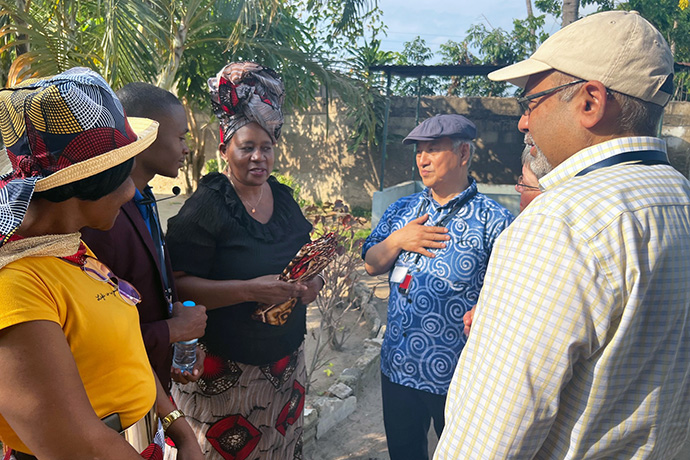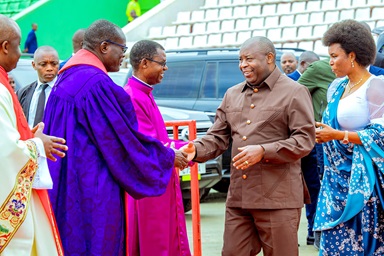Key Points:
- The board of Global Ministries met April 20-22 in Maputo, Mozambique. It was the first time the agency’s board meetings have been held outside the U.S.
- Roland Fernandes, who leads Global Ministries, said the board received “some very honest and open feedback” on efforts to move the church in Africa toward greater self-sustenance.
- $5 million in funding was approved for the Yambasu Agriculture Initiative, continuing to prioritize the effort to improve food security and strengthen farm communities across Africa.
African United Methodists and the United Methodist Board of Global Ministries remain committed to collaborating on mission work and the shared goal of helping the church in Africa become self-sustaining, the agency’s top executive said during its first board meetings outside the U.S.
“African partners are very interested in developing new and strengthening partnerships that recognize and utilize African assets, build capacity and develop leadership within African conferences and move the church in Africa towards greater self-sustenance … based on mutual respect and accountability,” said Roland Fernandes, who leads Global Ministries and the United Methodist Committee on Relief.
The agency’s board gathered April 20-22 in Maputo, Mozambique for its spring meeting. It was the first time the board has met outside the U.S.
Fernandes said the board received “some very honest and open feedback” on how self-sustenance was coming along.
“Some of it was affirming for the work we’re doing, especially in agriculture and health,” he said. “Some of it was critical of how our mission was done in the past, especially those instances in which Global Ministries has come in with the attitude that we know what is best.”

In a related move during meeting, the board approved $5 million in funding for the Yambasu Agriculture Initiative, continuing to prioritize the effort to improve food security and strengthen farm communities across Africa. The initiative is named for the late Bishop John K. Yambasu of Sierra Leone, who was a key player in the effort. Yambasu died in a car accident in 2020.
“(The Yambasu Initiative) is ambitious, enlisting sustainable agriculture in the causes of both food security and income production for local churches and annual conferences,” Fernandes said. “It puts land the church already owns into broad-based use. It can serve as a tool of evangelism through the promotion of community welfare and prosperity and hopefully will play a significant economic role in Africa’s United Methodist Church of tomorrow.”
Three days before the board meetings, the Africa Partners Mission Consultation gave members of the executive committee an opportunity to see missions work up close. It was the first in a series of gatherings planned over the next year to discern how God is leading United Methodists in mission. The full board later saw presentations of United Methodist-supported projects.
Holding the meetings outside the U.S. was significant, Fernandes said.
“Meeting in Mozambique dramatizes for me the need and the possibility of building broad community and collaboration within the church — to foster within the church a sense of global community and coming together in the name and spirit of Jesus Christ. Diversifying the location where the directors of this United Methodist agency convene is our testimony to the unity of the United Methodist community in faith and mission.”
Other actions at the board meetings included:
- $356,000 that was earmarked for scholarship funds in 2013 for the Asian Rural Institute was redirected for trainings, educational initiatives and disaster response in Asia.
- It was announced that the denomination’s guiding principles for missionary service will be updated, based on conversations being held with missionary groups.
Current events including the Ukraine war and faltering stock market affected the board’s finances in 2022.
The situation in Ukraine was credited with huge growth in operating revenues in 2022. Gifts to the International Disaster Relief Advance fund jumped from $3.9 million in 2021 to $30 million last year, and operating revenues grew from $72.2 million to $101.5 million.
However, net assets went down $48 million to $324.5 million, mostly due to unrealized market losses.
Subscribe to our
e-newsletter
“This primarily is all related to our investment losses,” said Mike Gurick, chief financial officer. “These are unrealized losses; we did not liquidate any of our investments.” In 2023, Global Ministries has seen about $10 million of unrealized gains.
Operating expenditures were $93.6 million, up from $53.1 million in 2021. Large grants from the United Methodist Committee on Relief to help migrants and victims of the Ukraine war accounted for that increase. One grant of $1 million went to Church World Service to support host committees in Moldova to improve access to needed services and relief for refugees from Ukraine.
Global Ministries collected “immense” data during the Africa Partners Mission Consultation, Fernandes said. He promised a summary of the results to African partners in 90 days for their review.
“We have hardly touched the surface,” he said. “Now that the consultation is done, we need to analyze the information … and figure out how we carry the work of the consultation forward so that it will have a meaningful impact.”
Even before the data is analyzed, there is a victory in the “humble leader” approach of the communication between U.S. and African participants, said Bishop Hee-Soo Jung, president of the Global Ministries board.
“The humble leader is a leader who actively lives within the reality of togetherness with the sense of empathetic unity,” Jung said. “So, it’s a tremendous, empathetic unity that we found and we celebrate.
“Hopefully God will, through the Holy Spirit, continue to strengthen our humble collaboration and the equity-related relationship in mission in Africa.”
Patterson is a UM News reporter in Nashville, Tennessee. Contact him at 615-742-5470 or [email protected]. To read more United Methodist news, subscribe to the free Daily or Weekly Digests.




